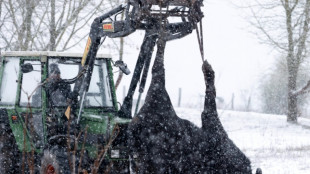
-
 Five things to know about New Glenn, Blue Origin's new rocket
Five things to know about New Glenn, Blue Origin's new rocket
-
Blue Origin set for first launch of giant New Glenn rocket

-
 Dutch police detain hundreds at climate protest
Dutch police detain hundreds at climate protest
-
Germany battles to secure stricken 'Russian shadow fleet' oil tanker

-
 Malala Yousafzai 'overwhelmed and happy' to be back in Pakistan
Malala Yousafzai 'overwhelmed and happy' to be back in Pakistan
-
'Education apartheid': schooling in crisis in Pakistan

-
 Smart glasses enter new era with sleeker designs, lower prices
Smart glasses enter new era with sleeker designs, lower prices
-
Supreme Court looks poised to uphold TikTok ban

-
 2024 hottest recorded year, crossed global warming limit
2024 hottest recorded year, crossed global warming limit
-
Germany reports foot-and-mouth disease in water buffalo

-
 US hikes reward for Maduro arrest after 'illegitimate' swearing-in
US hikes reward for Maduro arrest after 'illegitimate' swearing-in
-
Robots set to move beyond factory as AI advances

-
 Pro-Russian disinformation makes its Bluesky debut
Pro-Russian disinformation makes its Bluesky debut
-
UK gas reserves 'concerningly low', warns biggest supplier

-
 2024 warmest year on record for mainland US: agency
2024 warmest year on record for mainland US: agency
-
Meta policy reversal puts question mark on future of fact-checking

-
 Meta policy reversal puts question mark on furure of fact-checking
Meta policy reversal puts question mark on furure of fact-checking
-
Strong US jobs report sends stocks sliding, dollar rising

-
 US hiring beats expectations in December to cap solid year
US hiring beats expectations in December to cap solid year
-
UK gas reserves 'concerningly low': Biggest supplier

-
 Global stocks mostly fall before US jobs data
Global stocks mostly fall before US jobs data
-
Ubisoft: the 'Assassin's Creed' maker targeted by suitors

-
 Stock markets drift lower as US jobs data looms
Stock markets drift lower as US jobs data looms
-
Pakistan flight departs for Paris after EU ban lifted

-
 Nobel laureate Malala Yousafzai to visit native Pakistan for girls' summit
Nobel laureate Malala Yousafzai to visit native Pakistan for girls' summit
-
AI comes down from the cloud as chips get smarter

-
 Tajikistan bets on giant dam to solve electricity crisis
Tajikistan bets on giant dam to solve electricity crisis
-
Uruguay bucks 2024 global warming trend

-
 Last 2 years crossed 1.5C global warming limit: EU monitor
Last 2 years crossed 1.5C global warming limit: EU monitor
-
Japan 'poop master' gives back to nature

-
 US Supreme Court to hear TikTok ban case
US Supreme Court to hear TikTok ban case
-
US Fed's December rate cut should be its last for now: official

-
 Paris Hilton among celebrities to lose homes in LA fires
Paris Hilton among celebrities to lose homes in LA fires
-
Airbus boosts plane deliveries in 2024

-
 Ubisoft reviews restructuring options, postpones new Assassin's Creed
Ubisoft reviews restructuring options, postpones new Assassin's Creed
-
Lamborghini sets new sales record amidst hybrid push

-
 Lebanon army chief Aoun becomes president after two-year vacancy
Lebanon army chief Aoun becomes president after two-year vacancy
-
US emissions stagnated in 2024, challenging climate goals: study

-
 Lebanon army chief short of required majority in first round of president vote
Lebanon army chief short of required majority in first round of president vote
-
Global stock markets mixed tracking US rates outlook

-
 Lebanon meets to finally elect president after two-year vacancy
Lebanon meets to finally elect president after two-year vacancy
-
Celebrities flee Los Angeles fires, lose houses as Hollywood events scrapped

-
 Japan startup hopeful ahead of second moon launch
Japan startup hopeful ahead of second moon launch
-
Ukraine allies to hold last defence meet before Trump takes office

-
 Myanmar military adopts anti-junta fighters' drone tactics
Myanmar military adopts anti-junta fighters' drone tactics
-
CES tech looks to help world's aging population

-
 Rubber tappers forge sustainable future in Amazon
Rubber tappers forge sustainable future in Amazon
-
US astronauts upbeat seven months into eight-day mission

-
 Extreme weather, suburban sprawl fuel LA's wildfires
Extreme weather, suburban sprawl fuel LA's wildfires
-
Political chess or true beliefs? Zuckerberg's surprise Trump pivot

| SCS | -3.01% | 10.97 | $ | |
| RELX | -0.86% | 46.37 | $ | |
| RBGPF | 100% | 60.49 | $ | |
| RYCEF | -0.42% | 7.07 | $ | |
| NGG | -3.3% | 56.13 | $ | |
| VOD | -1.99% | 8.05 | $ | |
| CMSC | -0.79% | 22.92 | $ | |
| GSK | -1.99% | 33.09 | $ | |
| RIO | 0.36% | 58.84 | $ | |
| CMSD | -0.65% | 23.25 | $ | |
| BCE | -2.92% | 22.96 | $ | |
| BCC | -1.31% | 115.88 | $ | |
| BTI | -2.34% | 35.9 | $ | |
| BP | 0.54% | 31.29 | $ | |
| AZN | 0.64% | 67.01 | $ | |
| JRI | -1.16% | 12.08 | $ |

US farmers gird for trade wars on Trump tariff pledges
Donald Trump's first White House term saw a bruising trade war with China that left a lingering impact on farmers -- and many are bracing for further fallout as the President-elect threatens higher levies on Beijing.
Trump tariffs since 2018 hit some $300 billion of Chinese imports, sparking retaliation that targeted key farm products like soybeans and caused such exports to fall.
US farmers relied on subsidies to get by at the time and say China has since reduced its reliance on American agriculture products.
Trump has suggested tariffs on all imports this time -- with an especially high rate on China -- making many farm owners jittery of a return to trade tensions.
But this comes even as Trump's Republican party saw wide support in rural areas during this year's election, with many farmers supporting him despite the financial hit in the trade war. The hope is for economic conditions to improve.
- 'No money' -
"There was no money to pay the bills, no money to actually have a living out of the operation," said Ted Winter, whose farm in Minnesota grows corn and soybeans.
Retaliatory tariffs on the United States caused more than $27 billion in US agricultural export losses from mid-2018 to late-2019, the Department of Agriculture (USDA) found.
China accounted for around 95 percent of value lost.
Soybeans in particular made up nearly 71 percent of total trade loss, with Brazil gaining most of the lost trade.
Michael Slattery, who grows crops like corn, soybeans and wheat in Wisconsin, added: "I view this second term with tremendous trepidation."
Between 2017 and 2018 for example, his soybean income fell by over $25,000 -- and government payouts to alleviate the pain made up for just over half the shortfall.
The USDA estimates agriculture and related industries contributed a 5.6 percent share to GDP in 2023, while direct on-farm employment made up 2.6 million jobs as of recent years.
- Lasting hit -
"What is more frightening is the breakdown in commercial order that has taken decades to establish," Slattery said.
While US farm exports to China rebounded after Washington and Beijing reached a trade war truce in 2020, a year after the deal, American market share remained lower than levels seen before the retaliatory tariffs were enacted.
"The tariffs that were imposed upon China drove them to find other sources for their food needs," said Winter.
And without foreign buyers like China to absorb excess farm production, the market becomes oversaturated, in turn driving down prices and farmer incomes, said Slattery.
Federal payments may have been helpful to farmers during the trade war, but trade ramifications extended long beyond it, said Scott Gerlt, chief economist at the American Soybean Association (ASA).
- 'Prime targets' -
Soybeans and corn will again be "prime targets for tariffs" in a potential trade dispute, according to a National Corn Growers Association and ASA report last month.
Both commodities account for about one-fourth of the country's agriculture export value.
The report cautioned that many tariffs China imposed on US farm products have been given a waiver but could be reinstated -- triggering an average drop of 51.8 percent in US soybean exports from expected levels.
Similarly, corn exports to China would also slide.
Brazil and Argentina, meanwhile, are expected to gain global market share with higher exports.
If the United States was not a reliable trade partner, other nations would turn to other countries, said ASA's Gerlt.
"We saw some other buyers step in to some extent, like Egypt did for a while, but there is no replacing the size of the Chinese market," he told AFP.
Among tariff proposals Trump floated on the campaign trail, he warned that the United States should be careful with trade policy, especially when it comes to countries that are major buyers of US agriculture.
Ch.Lefebvre--CPN
